Do you feel a calling to help people but are unsure where your skills might best fit? If this is you, here’s the good news: a career in human services could be right for you.
Majoring in human services will help focus your desire to help others. This degree can lead to work assisting children and families and counseling those with drug and alcohol addiction issues, as well as a whole host of other issues relevant to social services.
In this guide, we’ll provide insight into careers such as these, as well as the broad range of degree options available in this field of study. A lifetime spent in the service of others can be a fulfilling and rewarding career choice. Get your start with a degree in human services.
What Is Human Services?

A degree in human services is a great place to start for those seeking a broad overview of different kinds of social services, both public and private. Human services is a multidisciplinary subject that lays a solid groundwork for those interested in a broad range of careers in social services and health care.
Through a mix of classroom instruction, practical training, and experiential learning, students majoring in human services examine how people behave, as well as a wide variety of social issues humans commonly face. This can lead to work in community-based social service agencies, at all levels of the government, and with all demographics of people.
Degrees such as these also help students decide which field of service might suit them best. They provide the kind of versatility required to move seamlessly between different areas of human services throughout the course of a long and rewarding career.
Jenn Breisacher is CEO of Student-Centered World, a professional development company for teachers. She earned her Master of Science in Human Services from Capella University in 2012 with a concentration in Public Service Leadership. She had this to say about her degree:
“Human services helped me so much as I transitioned from a classroom teacher to owning my own professional development company training teachers,” Breisacher tells Online Schools Report.
“It was a degree with a large enough umbrella that I could still stay in education but also have a leg-up on being able to expand from the traditional teaching paths into entrepreneurship.”
A full range of degrees are offered in human services, from associate degrees to bachelor’s degrees, master’s degrees, and even doctoral-level degrees. Many are available completely online.
Many human services graduates go on to join professional organizations after graduation. These professional organizations include The National Organization for Human Services (NOHS) and The American Public Human Services Association (APHSA), among others.
In addition to being great resources for professionals, these organizations are also great places for students to begin networking and exploring which career path in human services might be the best choice for them.
In the next section, we’ll take a closer look at just some of the careers made possible by a degree in human services.
Careers in Human Services
As previously stated, a human services degree prepares a graduate to work in a wide variety of roles for a broad range of social service agencies, in government, or for public and private nonprofit organizations dedicated to serving the needs of others.
In addition to the careers mentioned below, human services majors often go on to become child advocates, case management workers, and grief counselors. The next sections offer a closer look at each career listed below, including minimum education requirements and what to expect from each job on a day-to-day basis.
| Job Title | Approx. # years of education | Average Annual Salary |
| Social Worker | 4 | $50,470 |
| Sociologist | 6 | $83,420 |
| Social and Human Service Assistant | 2 | $35,060 |
| Substance Abuse, Behavioral Disorder, and Mental Health Counselor | 4 | $46,240 |
| Probation Officer and Correctional Treatment Specialist | 4 | $54,290 |
All salary data is courtesy U.S. Bureau of Labor Statistics Occupational Outlook Handbook.
Social Worker

Perhaps the most natural fit for a human services graduate is a career in social work. Social workers are employed in a wide variety of settings that include schools, hospitals, and child welfare and human services agencies, among many others.
Social workers help people cope with and solve problems in their daily life. This can mean matching individuals and communities of people with appropriate public resources or working with people one-on-one.
Sometimes social workers help an individual work through a major life change such as divorce, unemployment, or illness. Other times social workers match groups of people or entire communities with already-existing resources best suited to help address their needs.
These resources can include food stamps or other forms of childcare, health care, and mental health resources. Social workers may also have a hand in developing these programs.
Social workers must also on occasion deal with crisis situations, such as child abuse or other mental health emergencies. It’s also the job of a social worker to follow up with clients until the situation has been normalized.
Some social workers even provide psychotherapy services. Types of social workers include child and family social workers, school social workers, health care social workers, and mental health and substance abuse social workers.
It’s difficult to work with individuals when they are at their most vulnerable, meaning compassion is at a premium for those who choose to work in this profession.
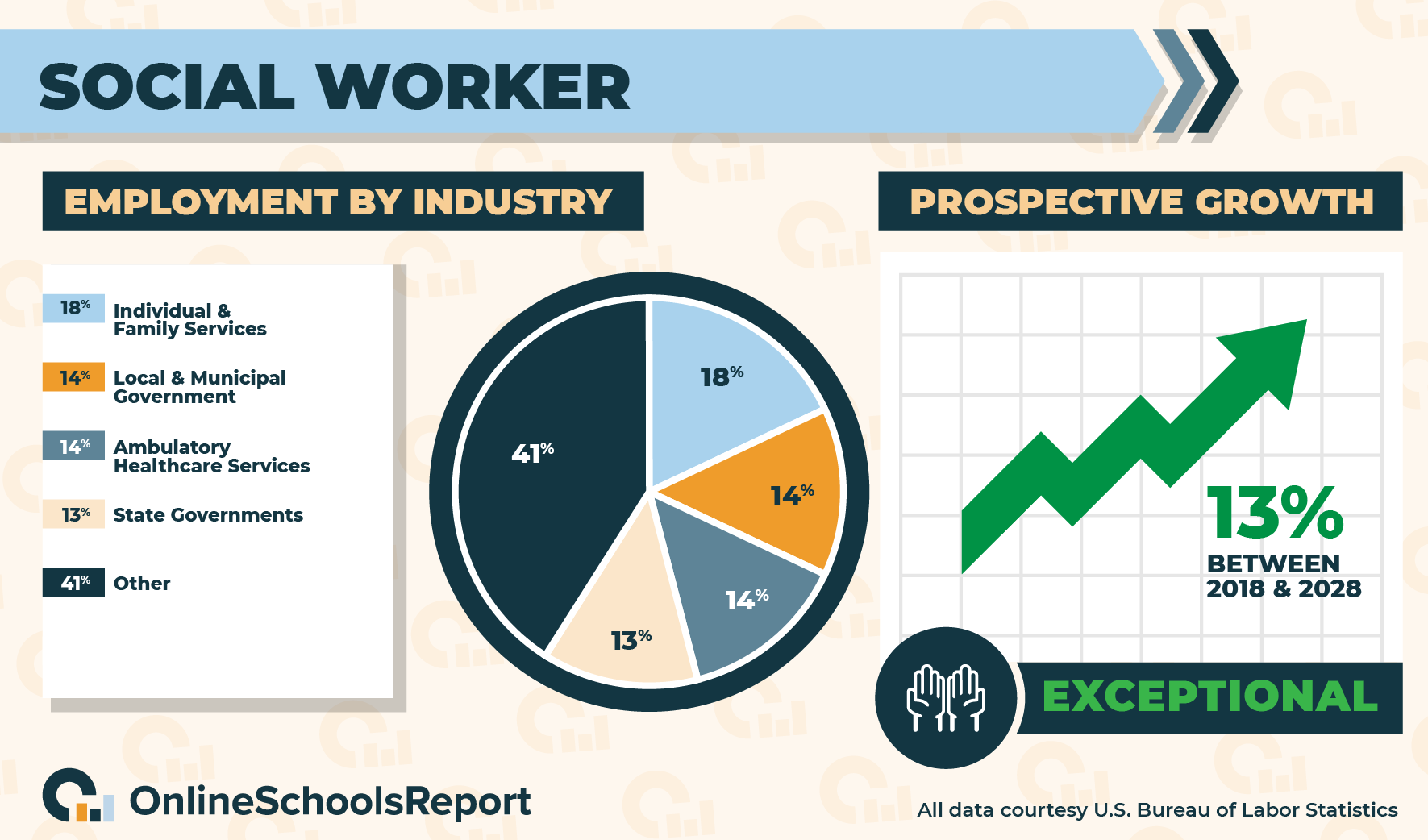
Entry-level work can be found with a bachelor’s in social work (BSW), though a master’s degree is required to work as a licensed clinical social worker (LCSW.) Two years of supervised clinical work is required to earn licensure, and licensing requirements vary between states.
Those holding a master’s degree in social work who have not completed two years of supervised clinical work have what’s called a master’s in social work (MSW). Social work master’s degree programs accept BSW graduates as well as students from related programs, such as human services, so long as certain prerequisites have been satisfied.
According to the Bureau of Labor Statistics, the average annual salary of a social worker is just over $50,000. Also according to the BLS, there are roughly 700,000 social work positions in the U.S. That number is projected to grow at a rate of 13% in the decade spanning 2018–2028, which is about twice the national average.
BLS data also states that 18% of all social work is done in individual and family services, while an additional 14% work for local and municipal government. Following that, 14% work in ambulatory healthcare services and 13% work for state governments. States with high levels of employment for social workers include California and New York.
Sociologist

Sociologists make a career out of studying societies and human behavior. Master’s degree programs in sociology are a natural extension for those who complete undergraduate work in subjects like human services.
Most often employed in academic settings or in governmental agencies, sociologists test theories about social issues through research projects, using data, surveys, observations, and interviews, among other sources.
The theories they research are often related to social issues, such as the roots of poverty, unemployment, and a wide variety of physical and mental health challenges, as well as the efficacy of governmental social service agencies.
After this data is collected, a sociologist draws conclusions that are then presented in reports, articles, talks, and lectures. Sociologists also frequently collaborate with policymakers, other social scientists, and other interested parties, such as social service and health care administrators.
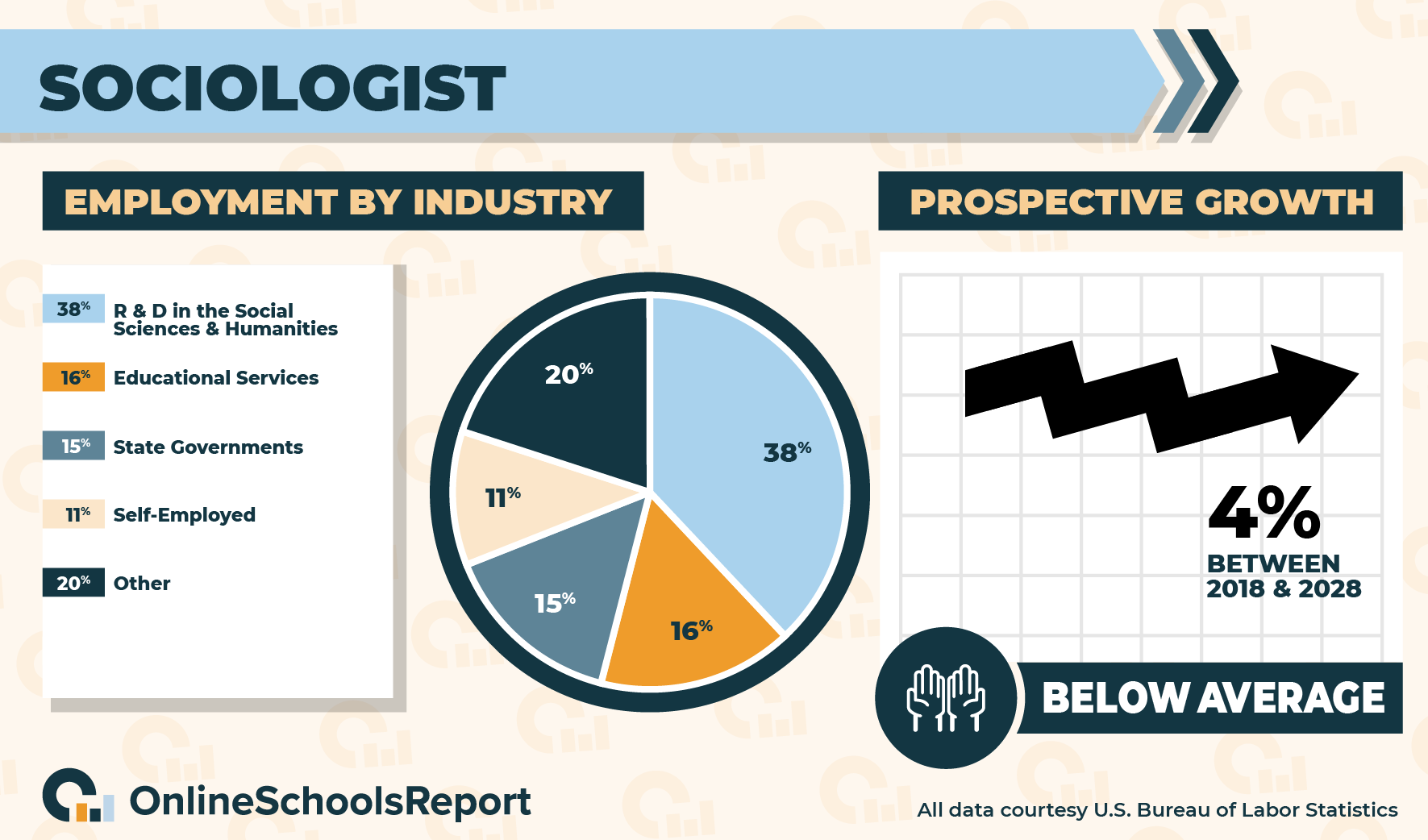
Specialties within the field of sociology include education and health, crime and poverty, families and population, and gender, ethnic, and racial relations.
Although there are bachelor’s degree programs in sociology, a master’s degree or even PhD in sociology is most often required to work as a sociologist or to teach at the college or university level.
There are two different kinds of master’s degree programs in sociology, and both accept students with undergraduate degrees in related subjects like human services. The focus of some programs prepares students to go on to complete their PhD, while others have an applied, clinical, or professional emphasis.
According to the Bureau of Labor Statistics, sociologists make on average about $83,000 a year. There are only about 3,000 sociology jobs in the U.S., making it a competitive career choice. That number is expected to grow at a rate of 4%, however, which is in-line with projected growth in many other professions in the U.S.
BLS data also states that 38% of all sociologists work in research and development in the social sciences and humanities. Following that, 16% find employment in a broad range of educational services and 15% work for state governments. Lastly, 11% of all sociologists are self-employed according to the BLS. Good states for sociologists to find work include California and New York.
A leading professional organization for sociologists is the American Sociological Association (ASA).
Social and Human Service Assistant

Social and human service assistants provide support for social workers. These are most often entry-level positions in social, psychological, and other forms of rehabilitation services.
Social and human service assistants also work with clients, guiding them toward community service resources to help develop a treatment plan and to best address their needs.
Social and human service assistants work with a broad range of clients. This list includes the elderly and people with disabilities, but also veterans, immigrants, and former prison inmates, to name just a few.
Social and human service assistants may assist a client with day-to-day activities, like bathing, shopping, or cooking. They may also research available community and social service-oriented resources. This can include food stamps or Medicaid, among others.
In addition, social and human service assistants help coordinate services such as these for their clients. An example of such assistance can include filling out paperwork. Social and human service assistants will also check in frequently with their clients to ensure such services are being adequately administered and that they are sufficiently addressing the needs of their clients.
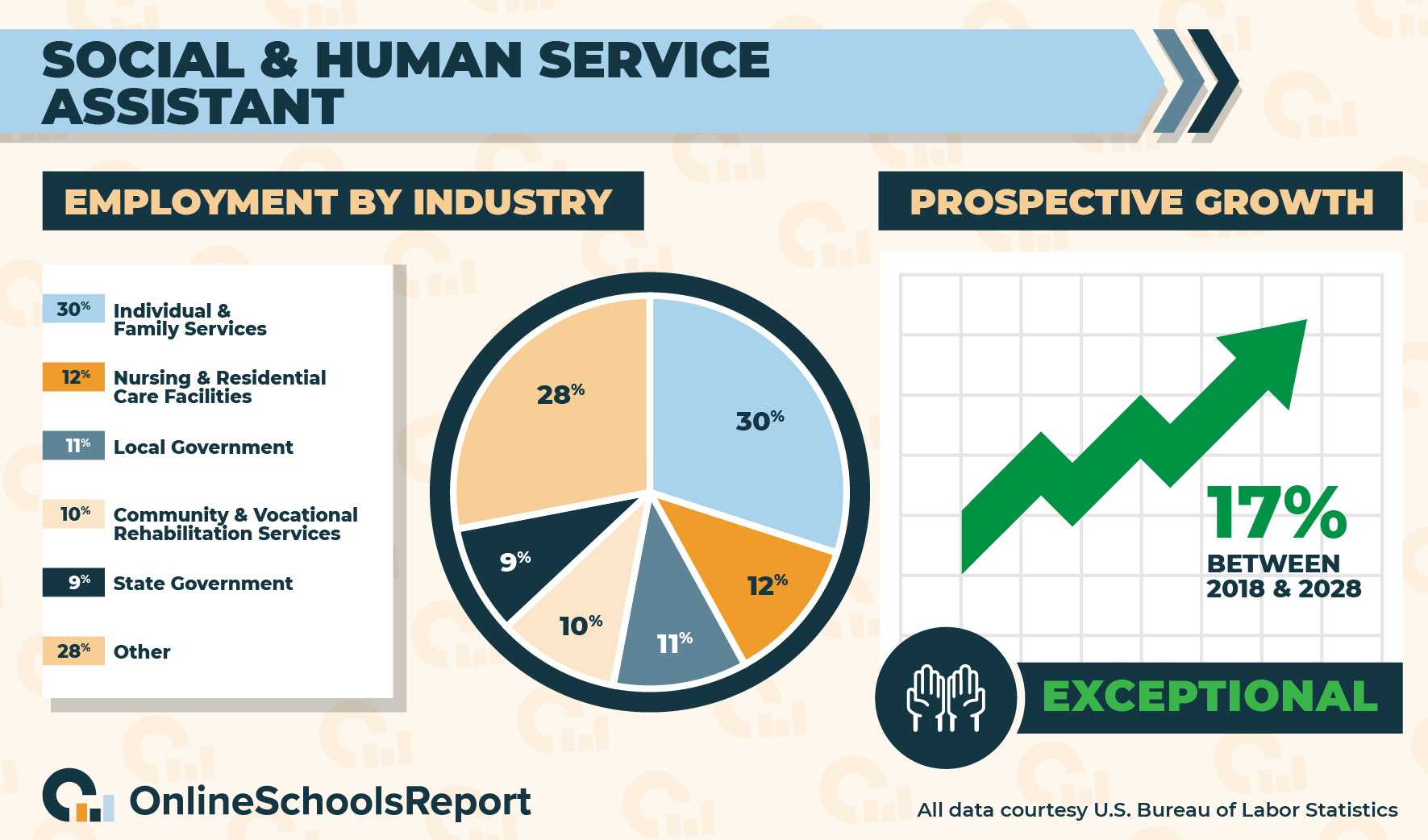
Technically, all that’s commonly required to become a social and human service assistant is a high school diploma or equivalent, though an associate degree in human services will increase employment opportunities. Degrees such as these provide both hands-on and fieldwork experience to students prior to entering the workforce.
Additionally, on-the-job training is provided by most employers. To advance in their career, most social and human service positions will require an advanced degree.
According to the Bureau of Labor Statistics, social and human service assistants make about $35,000 a year on average. There are about 425,000 positions in the U.S., and BLS data estimates that number to grow by 17% in the years ranging 2018–2028, which is over twice as fast as other professions.
Also according to the BLS, 30% of all social and human service assistants find work in individual and family services, while an additional 12% work in nursing and residential care facilities.
Following that, 11% work in local government, and 10% work in community and vocational rehabilitation services. That’s while the remaining 9% work for state governments. Good states to find work as a social and human service assistant include California and New York.
Some social and human service assistants seek their Human Services-Board Certified Practitioner credential from the Center for Credentialing & Education, open to anyone holding a human services degree from an accredited college or institution, as well as 350 hours of postgraduate human services work.
Substance Abuse, Behavioral Disorder, and Mental Health Counselors

Substance abuse, behavioral disorder, and mental health counselors provide treatment and advice to those suffering from a broad range of issues. That list can include alcoholism and drug addiction but also mental health and other behavioral disorders; these are problems plaguing millions of Americans all across the nation.
In their daily work, these human services professionals evaluate a clients’ mental and physical health, as well as all addiction issues or other forms of problematic behavior. They also formulate a plan for recovery.
Another part of the job of a substance abuse, behavioral disorder, and mental health counselor is to educate clients’ family members about addiction issues and behavior disorders. This helps them to develop their own strategies to support the patient.
Counselors of this sort also refer clients to other resources and services within the community. This can include support groups and job placement services. They may also conduct outreach programs related to addiction and behavioral issues.
These counselors often work in offices alongside other mental and human service health professionals, such as psychologists, social workers, and registered nurses.
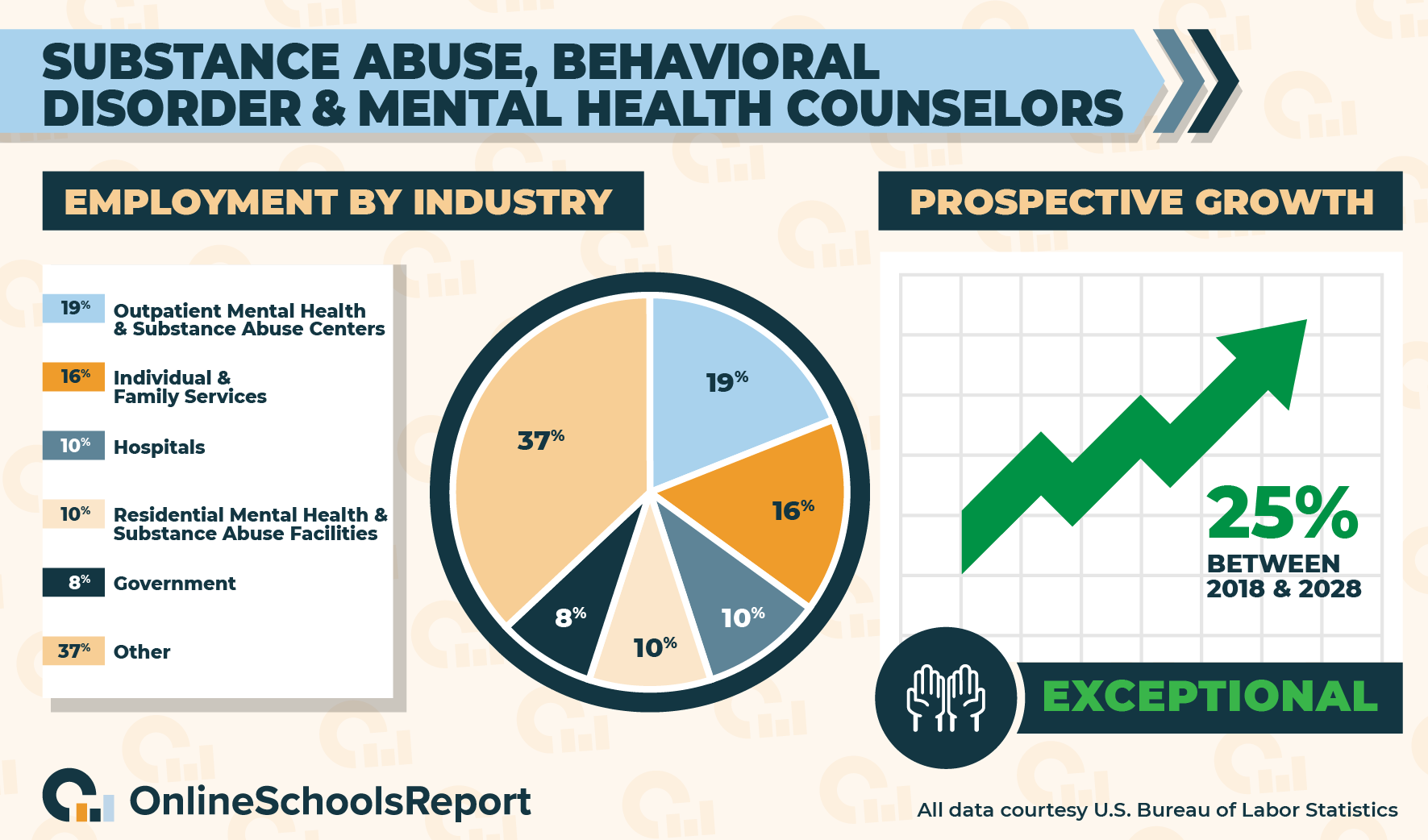
A bachelor’s degree is most often the minimum educational requirement to become a substance abuse, behavioral disorder, and mental health counselor. Some employers, however, simply require a high school diploma or equivalent. Other employers accept a certificate of completion in a relevant topic or an associate degree in a subject like human services.
A substance abuse or behavioral counselor must hold a master’s degree to work in a private practice, however. That includes up to 4,000 hours of supervised clinical experience, passing a state-issued exam, and completing continuing education annually. Other licensing requirements vary between states.
Individual state regulatory boards can be found through the National Board for Certified Counselors. Contact information can be found through the Addiction Technology Transfer Center Network.
According to the Bureau of Labor Statistics, substance abuse, behavioral disorder, and mental health counselors make just over $46,000 a year on average. There are roughly 320,000 jobs in this sort of counseling across the U.S. That number is expected to grow at an astonishing rate of 25% in the decade spanning 2018–2028, which is roughly five times the national average.
Also according to the BLS, 19% of all counselors of this sort work in outpatient mental health and substance abuse centers, while 16% work in individual and family services. Following that, 10% work for hospitals, 10% work in residential mental health and substance abuse facilities, and 8% are employed by the government.
An important professional organization for substance abuse, behavioral disorder, and mental health counselors is NAADAC, the Association for Addiction Professionals.
Probation Officers and Correctional Treatment Specialists

Probation officers and correctional treatment specialists are other common career paths for human services majors, assisting through a variety of social services the rehabilitation of law offenders in custody, on probation, or on parole.
There are several areas of speciality within this profession, including probation officers, parole officers, pretrial services officers, and correctional treatment specialists. Each has its own unique set of duties and areas of expertise.
Generally speaking, though, part of the job of a probation officer and correctional treatment specialist is to establish a course of rehabilitation while assessing the progress of probationers and parolees. This can often include interviewing friends and family, administering drug tests, and much more.
Supplying resources to probationers and parolees is also part of the job of a probation officer and correctional treatment specialist. This can include job opportunities and job skills training. Other job duties include participating in prehearing investigations or testifying in court regarding an offender’s background.
Probation officers and correctional treatment specialists must also write thorough reports and maintain detailed files.
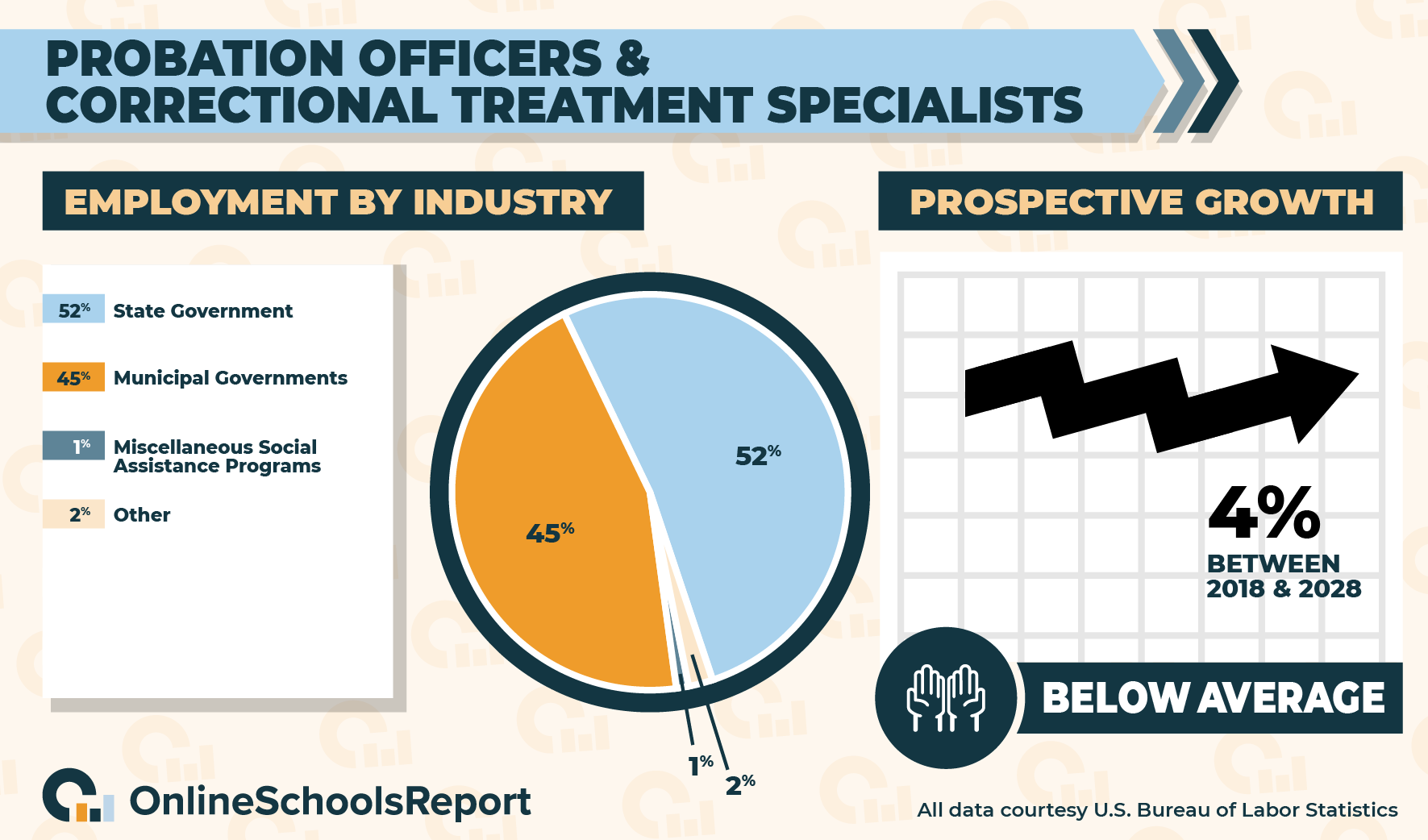
A bachelor’s degree is the minimum level of education commonly required to become a probation officer and correctional treatment specialist. Probation officers and correctional treatment specialists must also complete a training program sponsored by the state or the federal government, and pass a certification test. These requirements vary widely between states.
Median pay for a probation officer and correctional treatment specialist is just over $54,000 a year, according to the Bureau of Labor Statistics. The BLS also states there are about 91,000 positions in the U.S. That number is expected to grow at a rate of 4% in years between 2018 and 2028, an average rate of growth when compared to many other professions.
Also according to the BLS, 52% of all probation officers and correctional treatment specialists work for state governments while 45% work for municipal governments. A small percentage, just 1%, work for miscellaneous social assistance programs.
Human Services Degrees
No matter which career path you choose, the best place to start in human services is with any one of these fascinating degree options.
Associate Degree in Human Services

Many just charting their course for a career in human services begin with an associate degree. Associate degrees in human services are available as both Associate of Arts (AA) or Associate of Science degrees (AS).
Associate degree programs are also a great way to quickly and affordably complete the first two years of a four-year degree before transferring to a college or university.
An AA in Human Services focuses more on the humanities side of human services, while an AS degree tends toward the scientific nature of the field. Both help provide a broad overview of the many different kinds of professions made possible by a degree in human services.
Associate of Applied Science (AAS) degrees are also available for those interested in joining the workforce as quickly as possible. AAS degrees have a vocational bent, but they are rarely transferable to a four-year college or university.
In addition to general education requirements, common coursework in a human services associate degree program often includes an introduction to the topic, principles of sociology, perspectives on human behavior, among many others. Practicum and fieldwork experiences are also often required.
Many jobs in human services do require a bachelor’s degree as a minimum educational requirement. An AA, AS, or AAS degree, though, are accepted for some entry-level positions.
One career made possible by either an AA or AS in Human Services is that of a case management aide. Case management aides support case managers, working with the low-income, elderly, or disabled guests of a rehab center, hospital, or mental health center. On-the-job training is provided by most employers.
Online, hybrid, and accelerated associate degree programs in human services are also common. Typically, associate degree programs require 60 credits to be completed before graduation. This takes many students two years. A high school diploma or equivalent is also required, with a GPA of at least 2.0, as are minimum SAT or ACT scores. These requirements vary between programs.
Bachelor’s Degree in Human Services

Like an associate degree in human services, a bachelor’s degree in human services is also offered as a Bachelor of Arts (BA) or a Bachelor of Science (BS). There are also simply Bachelor of Human Services degree (BHS) programs, offering a broad and well-rounded overview of the subject-matter.
In addition, some schools offer a BS in Human Services Leadership for those interested in moving straight to administrative positions within the human services industry.
Otherwise, BA and BS degrees differ in terms of emphasizing the humanities-related side of human services, such as psychology, versus a more scientific orientation, like statistics and research. They will not only qualify a graduate for entry-level jobs but also mid-level and management positions.
Since human services is a multidisciplinary degree, a BHS will draw on sociology, psychology, and social work. A minor in a foreign language is also strongly advised at this step, since many human services agencies interface with populations for whom English is not their native language.
Other coursework in human services can include public health, health informatics, health care planning, wellness, health research, leadership, and more.
In addition, some degree programs allow for areas of concentration like addictions, child and adolescent development, and criminal justice. Online programs are common, as are hybrid online and in-person programs.
Most bachelor’s degree programs require 120 credits to complete. That’s usually around 40 courses. A high school diploma is required to apply to any bachelor’s degree program, with a GPA of at least 2.0, though this minimum can vary between programs. Many students transfer credits from an associate degree program.
Master’s Degree in Human Services

The next level of education in human services is either a Master of Arts or a Master of Science degree. These degrees will build on the framework provided by a bachelor’s degree. This prepares a graduate to work in managerial and leadership roles in a variety of human service organizations, to continue on to a doctoral degree program in human services, or to teach at the college or university level.
Although the two degrees are similar, an MA in Human Services remains focused on the humanities, such as psychology. These degrees often require a thesis, portfolio, or research project upon completion. That’s while an MS degree prioritizes fieldwork, internships, and research. These tracks emphasize analysis, research, management, and advocacy.
Other coursework in both an MA or MS Human Services often includes organizational assessment and evaluation, qualitative and quantitative research, and social and cultural diversity, among many others. Popular concentrations include grief counseling, non-profit management, and organizational and social services.
Further areas of concentration include child and family studies as well as gerontology. Topics covered in either an MA and MS include counseling skills and techniques, the foundation of human service systems, and the research and evaluation of human services.
Most MA and MS programs in human services take about two years to complete. As previously mentioned, some programs require a thesis as a condition for graduation, while some prioritize fieldwork. Online, hybrid, and traditional in-class programs are all common.
A bachelor’s degree with a GPA of at 2.0 is required to apply to a graduate program, though the minimum GPA requirement may vary. A bachelor’s degree in human services is the most commonly held degree by those applying to a master’s degree program. A degree in a related subject is accepted by many institutions, so long as certain prerequisites have been satisfied.
The GRE is sometimes required to apply for a master’s degree program in human services, but again, this can vary between programs.
Doctorate’s Degree in Human Services

There are two types of degree options at the pinnacle of education in human services: a Ph.D. in Human Services, and a Doctor of Human Services (DHS). Students in Ph.D. programs are interested in contributing their own research to the field of study. DHS programs, on the other hand, seek new ways to apply existing research to real-world scenarios.
Many seek degrees in human services at the doctoral level to advance their careers in managerial and leadership positions, to teach or conduct research at the university level, or to seek licensure as a social worker or counselor.
Common coursework in a Ph.D. or DHS program covers topics ranging from ethical decision making, communication for leaders, financial planning, and organizational effectiveness. Popular concentrations include nonprofit management, family studies, and crisis management and disaster relief.
Both programs are offered online, in a hybrid model, or completely in-person to accommodate the schedules of those already working in the field of human services. Most programs take up to five years to complete, though some allow students to take up to ten years to graduate.
Programs usually require between 55 and 62 course credits, with a dissertation defense required, which will be researched, written, and developed in tandem with a faculty advisor. Practicum and fieldwork experiences are rarely required, though many programs require academic residencies, which can last up to four months.
A master’s degree from an accredited program in human services or a related subject is required to apply to a doctoral program, with a GPA of 3.0. GRE scores are sometimes required, though this varies between programs, as do the minimum GPA requirements. Letters of recommendation or a personal statement of intent may also be required.





